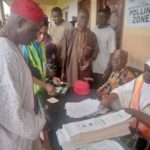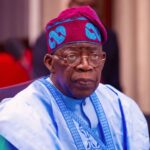By Julius Ogunro
There is this idea that has gained currency among some northern politicians and their southern associates in the two major political parties. It is that only a northern presidential candidate can win the presidency, especially if the other major party fields a southerner.
This, surprisingly, has caused a ruckus not only in the PDP but in the ruling APC as well, where some critical stakeholders appear to have bought into the idea and are surreptitiously working for the emergence of a northern presidential candidate in the APC. They say it is a fallback plan in case the PDP should go that route.
- NAFDAC seeks partnership with NYSC against fake drugs
- I’ll support whoever emerges as PDP candidate – Bala Mohammed
In my view, this notion that only a northern presidential candidate can win is completely self-serving and short sighted. And, even more important, it is not true. It is not supported by fact or any shred of evidence or history. No region can single-handedly produce the president without substantial political investments and support from the other regions.
In 2003 and 2011, Presidents Olusegun Obasanjo and Goodluck Jonathan, both southerners, defeated northern candidates for the presidency. A study of the voting pattern in 2003 shows that Obasanjo carried the day in 25 states, plus the FCT. His major challenger, Muhammadu Buhari won in 11 states, all in the far North. Obasanjo won all the southern states, plus all the states in the North Central, as well as some far northern states with large Christian and minority populations such as Adamawa and Taraba.
Let us concede. The incumbent Obasanjo had an unfair advantage – a large war chest, the PDP behemoth and all government agencies working for his re-election. All of those, however, could not prevent him from losing 11 states in the far North. But the fidelity of the PDP structures – its governors, other elected officials and political appointees across board – ensured that even in the places where the party lost, they were not trounced but had a good showing.
A similar scenario played out in 2011 with President Goodluck Jonathan. He won 22 states, plus the FCT, while his main challenger, Buhari was victorious in 13. The voting approximates what happened in the 2003 presidential election, with all of the southern states, except Osun, going to Jonathan. Also, aside Niger, he won all of the North Central states, as well as Taraba and Adamawa, the two North East states that were also carried by Obasanjo.
Also, like Obasanjo in 2003, Jonathan did reasonably well in the core northern states where he lost, coming close second in some and getting the mandatory 25 per cent of the total votes in others. Jonathan’s performance in these far northern states where he was least popular should be attributed to party fidelity demonstrated by his PDP supporters.
What the results and voting pattern above clearly illustrate is that having a northern candidate does not translate into clearing all the northern votes and automatic victory as being misconstrued. It also shows that the idea of one monolithic north in terms of voting patterns does not exist. The North has always been more complex than the South and has a history of expressing more diverse electoral opinions when compared to the south.
Frankly, it is improbable that the voting pattern in a state like Sokoto, with a majority (Hausa-Fulani) Muslim population, would be the same as Plateau, a state with a Christian majority. These states may belong to the same geographical location called the north but they cannot be more different in terms of culture, religion and outlook. In fact, northern states such as Benue and Kwara may be culturally closer to the South than to the North.
So, what would likely be the outcome of a North versus South pair up by two major political parties in 2023? As it happened in 2003 and 2011, the party that is likely to carry the day would be the one with more entrenched political structures across the country. And that is the APC, the party that is currently governing at the centre and which will derive all the benefits that, that advantage confers. At present, the APC is as strong as the PDP in 2003 and 2011 and has as many governors and elected officials as the former ruling party.
Let me explain further. Assuming the APC presents a southern Christian candidate and the PDP presents a Northern Muslim, I believe the voting pattern would be similar to those of 2003 and 2011. The APC would win the majority of states in the south (if not all of them), in addition to the North Central states and several core northern states with large Christian populations. And because of its formidable structures in the far northern states, where it has a daunting majority in terms of elected officials, its losses in those places would not be significant a la Obasanjo in 2003 and Jonathan in 2011. In all, I see the party winning a clear victory in the first round of voting with such a matchup.
However, the APC would only be in trouble in this case if its elected officials and government appointees in the far northern states throw it under the bus and put regional loyalty ahead of party fidelity. That is, however, unlikely considering the huge benefits they derive by belonging to the party in power. It is not unlikely though that a pocket of APC party men would do this, voting for regional and religious solidarity, but this would not be wholesale. I see the majority of the APC apparatchiks and leaders holding the line and standing firm with the party and its southern presidential candidate.
After the eight-year rule of a Northern Muslim, fairness, equity and common sense demand that the presidency should go down south and specifically to a southern Christian. This argument that only a north-centric candidate can win is faulty and introduces a dangerous dimension to our body politic. Assuming that the political parties were to fall for this line of reasoning this time, what about the next election cycle? The point is that this argument can be made Infinitum, which implies that the major parties will keep presenting far northern Muslim candidates ‘in order to win.’ That is inconceivable. Our country is already at a tipping point and we should be very deliberate about our actions at this time in order not to push the cart over the wall.
Ogunro wrote from Abuja
 Join Daily Trust WhatsApp Community For Quick Access To News and Happenings Around You.
Join Daily Trust WhatsApp Community For Quick Access To News and Happenings Around You.


